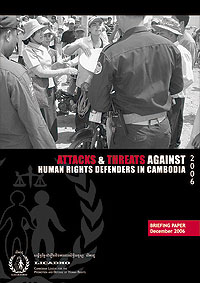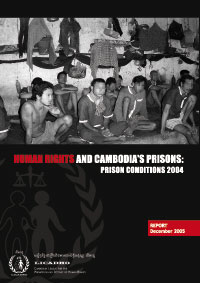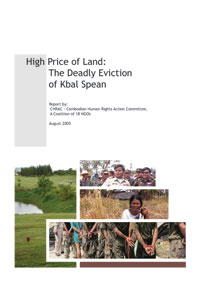Reports & briefs
Briefing | Born Samnang & Sok Sam Oeun Trial Issues and Transcript
25 January 2007
The August 1, 2005 trial and convictions of Born Samnang and Sok Sam Oeun for the murder of trade unionist Chea Vichea was marked by violations of fair trial rights and a lack of credible evidence. The following are some of the main issues raised by the trial that will be reviewed in this paper: 1/ Failure to hear prosecution witnesses in court, 2/ Lack of evidence, 3/ Undue reliance on confessions, etc.
The unofficial transcript is based on written notes taken during the trial; it is not verbatim and some parts of the trial were inaudible.
Briefing | Restrictions on the Freedom of Assembly in Cambodia 2006
12 January 2007
In 2006, Cambodian authorities continued to restrict freedom of assembly. The ongoing clampdown is being conducted by arbitrarily objecting to demonstrations, violently dispersing many peaceful protests and arresting participants in legitimate assemblies. In denying the basic human right of freedom of assembly - enshrined in international treaties and Cambodian law - the State is trying to silence voices of protest and stop people organizing themselves to stand up for their rights.
This briefing paper is the third in a series of reports, published in 2004 and 2005, on restrictions of the right to freedom of assembly in Cambodia. It records some of the instances between 1 December, 2005, and 30 September, 2006, when peaceful assemblies were subjected to intimidation or violence by state forces or state authorities, as well as occasions where the Phnom Penh municipality objected to peaceful gatherings that were being planned.

10 December 2006
2006 has been a bad year for human rights defenders in Cambodia. On January 1, two of the country's most prominent human rights activists woke up in Prey Sar prison, following their arrest the previous day on charges of defaming the government. Days later a third activist was also arrested and detained. Others went into hiding, victims of a crackdown on free expression that threatened to paralyze Cambodia's vibrant yet vulnerable civil society.
While international outrage helped to secure the release of the three jailed activists by the end of January, the arrests set the scene for one of the worst years for human rights defenders in recent memory. Although this report covers only the first ten months of 2006, there have been many more serious attacks on human rights defenders during this period than in the whole of 2005.
Briefing | Asian Human Rights Day Campaign 2006: Ratify, Remove, Report and Remedy
9 December 2006
On Human Rights Day this year, we remind all governments that almost sixty years ago in 1948, world governments adopted the Universal Declaration on Human Rights, which articulated and codified the rights of all individuals, with the fundamental message that every person is born free and equal with inalienable human rights, simply because he or she is a human being.
Despite this universal recognition decades ago, people continue to suffer from the denial of basic rights throughout the world. We, as human rights defenders in Asia, are particularly concerned about the deteriorating state of human rights in the region, as well as disappearances, extrajudicial killings and persecution of human rights defenders, aggravated by the prevailing culture of impunity for human rights violators and renewed emphasis by Asian governments on "cultural specificities" to justify human rights violations.
Briefing | Comments on the ECCC Draft Internal Rules
17 November 2006
The Cambodian Human Rights Action Committee is pleased to note that the Draft Internal Rules for the ECCC ("Rules") include a number of very positive developments that can set a good example for Cambodian law generally. CHRAC welcomes the opportunity to give comments and believes that involving civil society in this historic process will only make the Extraordinary Chambers stronger.
CHRAC has nine main areas of concern regarding the ECCC Draft Internal Rules: 1/The additional power of the Pre-Trial Chamber, 2/The nature of supermajority voting, 3/Protecting defence rights, 4/Ensuring meaningful victim participation, protection and reparations, 5/Providing widespread public access to reasoned decisions of the Court, 6/Preventing in absentia trials, 7/Clarifying the role of the Constitutional Council, 8/Guaranteeing high quality interpretation, 9/Protecting ECCC personnel, victims, witnesses, and accused from defamation and libel actions in the Cambodian courts.
Presentation | The Best Interests of the Child in Cambodian Court Presentation
24 October 2006
"We demand a lot from children when we ask them to be participants in the court system, therefore, in a system designed for adults, we need to adapt practices to make them sensitive to children caught up, through no fault of their own, in the system."
A slideshow presentation on the best interest of the child in court.
Briefing | UNHRC: Ongoing Deterioration of Human Rights Situation in Cambodia 2006
18 September 2006
The Asian Forum for Human Rights and Development (FORUM-ASIA), together with its member organizations, the Cambodian Human Rights and Development Association (ADHOC) and the Cambodian League for the Promotion and Defense of Human Rights (LICADHO), wish to draw the Human Rights Council's attention to the Cambodian government's severe lack of commitment to and fulfillment of its human rights obligations.
This paper covers warning signs of abuses prior to upcoming elections, repressive new laws and lack of meaningful legal and judicial reforms, forced evictions, and lack of transparency, independence and competence in the judicial system.
Briefing | NGO Laws & Crackdowns on Human Rights Defenders: International Lessons for Cambodia
14 September 2006
In the Cambodian context, any NGO law - regardless of its particular content - poses a threat to the work of human rights defenders and other NGOs. While human rights defenders are most at risk because of their role in criticizing government actions, the objectives of all NGOs and development agents - both foreign and domestic - can be compromised.
This paper highlights the experience of six Asian countries with laws similar to the proposed Cambodian NGO law is outlined below.
Presentation | Human Rights in Cambodia Presentation 2006
11 August 2006
A slideshow presentation on Human Rights situation in Cambodia 2006.
Report | Human Rights in Cambodia: The Facade of Stability 2006
1 June 2006
Beneath the veneer of political stability and economic development, the people of Cambodia continue to suffer.
Cambodians are increasingly subject to a wide range of human rights abuses - often committed by State personnel such as police and military - with little recourse to justice in Cambodia's notoriously corrupt and politicized courts. Land conflicts arising from private claims or large economic land concessions are evicting thousands of families from their homes every year, depriving them of education, health services and other essentials while fuelling poverty and discontent.
Cambodia's police and judiciary, universally deemed as rife with corruption and impunity, fail on a daily basis to provide any semblance of justice for victims of human rights abuses.
Briefing | Threats to Human Rights Defenders in Cambodia 2005
1 June 2006
The situation for human rights defenders in Cambodia deteriorated markedly in 2005. Human rights advocates, community activists and trade union leaders have been among those targeted for their work defending basic human rights. The intimidation they faced included physical and verbal assaults, malicious lawsuits and criminal charges, arrests and detentions. These were symptomatic of a year marked by attacks on civil society and increasing intolerance towards criticism of the Government.
While physical violence towards human rights defenders has decreased over recent years, there has been a shift towards other forms of coercion and intimidation with a veneer of legality.
Briefing | Legal and Judicial Reform in Cambodia
26 February 2006
During 2005, the Cambodian Government did not demonstrate satisfactory progress toward legal and judicial reform, and hence failed in its stated aim of strengthening the rule of law in Cambodia. The concept of 'rule of law' prevails where (i) the government itself is bound by the law, (ii) every person is treated equally under the law, (iii) the human dignity of each individual is recognized and protected by the law and (iv) justice is accessible to all. This widely accepted legal principle is intended to safeguard against arbitrary rulings and misuse of power, and is vital to the healthy functioning of a viable democratic Government and State.
The Government has had the entire year of 2005 to take action on agreements made during the December 2004 Consultative Group (CG) meeting. Yet the initiatives taken by the Government were disappointing. The minimal efforts made towards creating a healthy legal system that promotes liberal democracy and human rights were heavily outweighed by the retrograde steps that saw freedom of expression curtailed and government critics imprisoned
Briefing | Attacks on Freedom of Expression & Political Rights
16 January 2006
Freedom of expression and other democratic rights are under dire threat in Cambodia, as the government continues to use the judiciary to imprison its critics and political opponents. Prominent human rights activists, journalists and trade unionists, as well as opposition members of parliament, have been targeted in a series of government-initiated prosecutions.
Report | Violence Against Women in Cambodia 2005
1 January 2006
Whilst violence against women in Cambodia is a difficult issue to accurately quantify, it is clear that it is a serious problem and there are an increasing number of reports of domestic violence, rape and trafficking. Although Cambodia is beginning to recognize the significance of these issues the extent of the government's willingness to educate the judiciary, the police and the public on these issues is still very limited.
Cambodia ratified the Convention on the Elimination of all Forms of Discrimination Against Women (CEDAW) in 1992 and since then there has been insufficient action undertaken by the government to implement the principles contained in the convention. Most notably the Royal Government of Cambodia (RGC) passed the Law on the Prevention of Domestic Violence and the Protection of Victims in September 2005 and a draft Law on Human Trafficking and Sexual Exploitation is currently being reviewed by law-makers. However the RGC's progress in reducing/eliminating violence against women since 1992 has been slow and often inadequate.

31 December 2005
Since 1997, LICADHO has issued reports on human rights in Cambodian prisons, highlighting the most serious human rights concerns and recommending avenues of change. As an independent non-governmental organization, LICADHO has several key aims: 1/Monitor Cambodian prisons and prisoners' rights 2/Disseminate relevant high-quality non-partisan information. 3/Lobby for positive reform.
It is our hope that this report will be used by government and prison officials, human rights advocates, researchers, media, aid donors and legal professionals as a tool to identify existing problems, improve prison conditions and to promote prisoners' rights.
Briefing | Restrictions on the Freedom of Assembly in Cambodia 2005
11 December 2005
The Cambodian government continues to maintain strict measures to suppress demonstrations or public gatherings of all kinds in the country. From January to November 2005, the authorities made attempts to prevent or disperse at least 40 public gatherings, including rallies and demonstrations, street marches, public discussion forums, labor strikes and protests over land disputes. Police and authorities have refused permission for public gatherings to be held, or otherwise tried to discourage them including by threatening to arrest participants, and have at times forcibly broken up gatherings.
Document | Open Letter on Khmer Rouge Tribunal
30 November 2005
"(...)I urge the Royal Government of Cambodia to follow the United Nation's example and release the names of the Cambodian candidates under consideration and the selection criteria far enough in advance of the final decision. This would allow civil society organizations and international community to comment on the Cambodian candidates. By doing so, the government will improve the credibility and transparency of the selection process. Even if civil society finds no new information about the candidates, the government will strengthen public confidence in the process by allowing civil society participation. Moreover, civil society might turn up new information - after all, when looking for something, many pairs of eyes are better than one pair of eyes. This too would strengthen the selection process.(...)"
Open letter by Dr. Kek Galabru, President of LICADHO
Briefing | Harmful Effects of Economic Land Concessions on Poor Cambodians
20 November 2005
In 2001, the Cambodian government instituted a new land law in part to standardize the awarding of economic land concessions which, hitherto, were governed by little legislation which, in any event, was mostly ignored. Economic land concessions in Cambodia normally involve very large tracts of land and are similar to long leases; they are usually for 70 years with a right of extension. The land law provided a general framework for economic land concessions and called for adopting administrative rules which the government is nearly finished preparing. It is doubtful, though, that the government and concessionaires will respect this greatly improved framework, and therefore doubtful that the well-documented abuses of the past will cease. These abuses had important social, economic, cultural and environmental consequences involving the dispossession and impoverishment of local populations. They also led to many conflicts.

1 September 2005
This case study discusses the mass eviction that took place on 21 March 2005 in Kbal Spean village, near the Thai-Cambodian border at Poipet. The eviction resulted in the shooting deaths of 5 villagers, injuries to at least 40 more (including 14 seriously injured) and the temporary detention of 30. Journalists and staff of various Non-Governmental Organisations (NGOs) witnessed the eviction, and the case was heavily reported in the media. The extent of the violence and injuries shocked the public; however, to date no successful prosecutions have been brought for offences committed at the time.
Presentation | Women's Rights Presentation 2005
26 May 2005
A slideshow presentation on the situation of women in Cambodia.